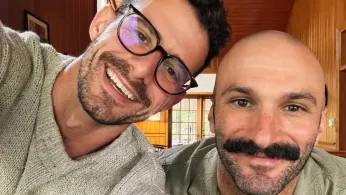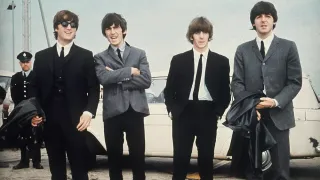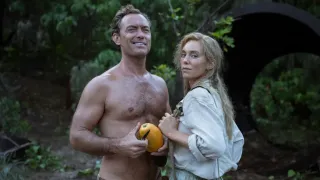
3 hours ago
ProbablyThis Breakup Goes Viral: Beau Ciolino and Matt Armato Face Internet Spotlight After Fist Bump Farewell
READ TIME: 3 MIN.
On August 15, 2025, Beau Ciolino and Matt Armato, the creative duo behind the beloved LGBTQ+ lifestyle brand Probably This, stunned their audience with a social media video announcing the end of their 12-year partnership—10 years of which had been shared with fans through DIY projects, design inspiration, and glimpses into queer domestic life. Their TikTok and Instagram platforms, @ProbablyThis, amassed over 650,000 followers and millions of likes, making their relationship one of the internet's most visible examples of queer domesticity.
The announcement video, while brief, became instantly iconic for its awkward tone and the now-infamous fist bump that punctuated the end of their message. Beau appeared upbeat, zooming into the frame with playful energy, while Matt's response was subdued and direct: "Well, we broke up." Beau continued, “It’s been a privilege doing 12 years together as partners and for 10 years sharing that online with everyone. I think that there is so much love between us and really loving someone knows when to change the format of the relationship, and we’ve decided to just be best friends.” Matt, meanwhile, called the video "the dumbest" thing, quipping, “This belongs in my journal, not out there, but I want you to know I’m single”.
Intended as a heads-up for close followers, the video instead unleashed a flood of attention from across social media, as viewers dissected every glance, tone, and gesture. The awkwardness of the fist bump—seen by many as emblematic of a relationship at a crossroads—became a meme, with thousands of reposts, tweets, and TikToks analyzing the body language and apparent tension. Some fans expressed heartbreak, while others critiqued the decision to share such personal news so publicly.
Ciolino and Armato, both seasoned in the highs and lows of online fame, responded to the wave of commentary in a recent interview with LGBTQ+ publication Them, addressing the intensity of internet discourse and emphasizing that viewers see only a fraction of their reality. They noted that while their breakup video was meant for their community, it quickly "burst the bubble" of their intended audience, exposing them to scrutiny and speculation from strangers.
For queer couples in the public eye, the experience of ending a relationship can be both intensely personal and unavoidably communal. Ciolino and Armato have spent a decade modeling queer domestic life, offering a vision of partnership, creativity, and resilience for LGBTQ+ audiences seeking relatable representation. Their breakup touches on questions that resonate widely: How do queer creators balance authenticity and privacy? What does it mean to grieve or celebrate change in front of an audience whose affection is real but fundamentally mediated by screens?
In their statements following the backlash, both creators remained committed to kindness and gratitude. Beau described their continued friendship and even referenced vacationing together after the split, while Matt expressed a need to "lick my wounds" and pride in their shared accomplishments. The pair’s decision to publicly address their breakup—and the emotional complexity that followed—offers a case study in the challenges and opportunities of queer visibility.
The viral nature of the breakup video, which has since been deleted following overwhelming online attention, underscores both the visibility and vulnerability of LGBTQ+ creators. As Ciolino and Armato look to the future, their story remains a powerful reminder of the evolving ways queer relationships are lived, documented, and celebrated online.
For fans and followers, the end of Probably This as a couple does not mean the end of their impact. Both Beau and Matt have signaled intentions to remain friends and collaborators, continuing to shape queer lifestyle content in ways that center joy, resilience, and honest storytelling. Their openness about vulnerability and change sets a precedent for how queer creators might navigate the shifting boundaries between personal and public life—reminding audiences that love, in all its forms, remains worth sharing.






